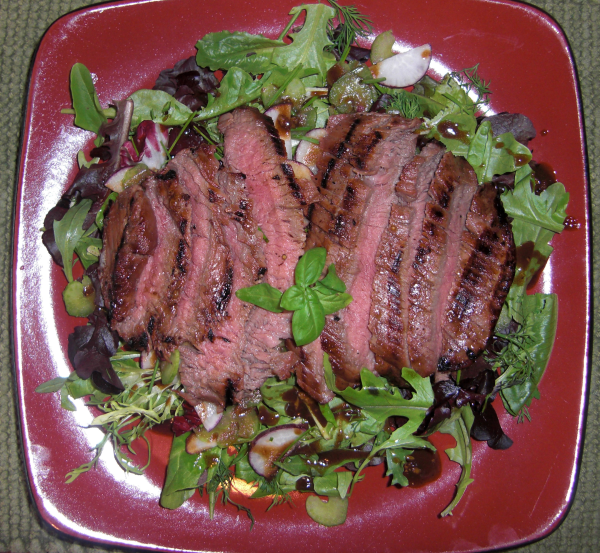Want to lose weight, become healthier and mitigate or prevent autoimmune processes in your body? These goals are foremost in my mind and I know they are for those who seek care at my office. For the last several years - ALL the patients who have found their way to my office have an autoimmune disorder - and ALL have either a gluten intolerance gene or two, a celiac gene, or both.
From the Desk of Dr. Karl R.O.S. Johnson, DC.....
Gluten Free, Casein Free, Soy Free Recipes Help with Autoimmune Illness
Posted by Dr. Karl R.O.S. Johnson, DC on Sun, Dec 04, 2011
Topics: autoimmune, gluten free, recipes, gluten intolerance, Hashimoto's diease
Blood Type Friendly Gluten-Free Thanksgiving Meal Recipes - FREE
Posted by Dr. Karl R.O.S. Johnson, DC on Wed, Nov 02, 2011
Want to continue your health supporting lifestyle and plan a GREAT Thanksgiving dinner that is friendly for all blood types and gluten free? Look no further. You can click on the link below to download the D'Adamo approved Thanksgiving feast.
Topics: gluten free, D'Adamo, BTD, Blood Type Diet
Why A Gluten Free Diet May Not Be Enough to Stop Inflammation
Posted by Dr. Karl R.O.S. Johnson, DC on Tue, Aug 16, 2011
Adopting a gluten free diet has helped many people begin a healing process that will take years. Thanks in part to a recent surge in gluten sensitivity diagnoses and improved gluten free products, more and more people are starting down the path that will help them find relief for the chronic pain, inflammation, fatigue and intestinal distress they have suffered with for many years. However, a gluten free diet alone may not be enough to stop inflammation from occurring. People who have started a gluten free diet but who still experience inflammation and other symptoms should consider additional testing and dietary and lifestyle changes to address ongoing, chronic symptoms.
Why Do I Still Feel Bad?
Adopting a gluten free diet makes most people with a gluten sensitivity or other inflammatory diseases like Fibromyalgia and thyroid disorders feel better within a short time frame. Severe symptoms may begin to abate, energy will start to return and skin disorders like psoriasis may begin to clear. But living gluten free is usually not enough to completely avoid the inflammatory symptoms caused by gluten and its relatives.
This happens for several reasons. First, cross contamination of gluten free food is common and gluten can hide in a variety of foods people might not consider as having gluten such as sauces, sour cream and snack foods. Additionally, many foods that are similar to gluten react with the gluten antibody. An immune system already on the defense against gluten will treat these other foods the same way it treats the gluten peptide thus starting the cycle of inflammation all over again. Finally, there could be additional unidentified health concerns contributing to a body's inflammatory response.
Additional Testing
Medical tests are not one size fits all and often, people receive misinformation from the medical community because physicians simply ordered the wrong test. Proper testing has to go in depth and cover a wide range and breadth of issues to truly present a whole picture of a patient. Until recently, there was only one test used by the medical community to determine if people had a gluten sensitivity or not and this test was often wrong.
Thankfully, Cyrex Labs in Arizona developted several tests that are more sensitive and more accurate and that allow physicians to look further into a patient's gluten sensitivity. These tests include:
Topics: Dr Karl Johnson, autoimmune, Cyrex Labs, gluten, gluten free, inflammation
Gluten can cause health issues for many people. Some may have an intolerance or allergy, also known as Celiac disease, some may not be sure if they have a problem with it or not, but would like to try avoiding it in order to find out. This however, may not be as easy as it sounds. At first it seems easy, cut out breads, muffins, bagels, and so on. Simple right? Maybe not.
Did you know that you could be unaware of some of the foods that has gluten hiding in them? Or foods you might not think about when you think about cutting it out of your life. Of course when you think fried chicken, you think flour used for frying which makes it easy to see you should stay away from it. You might not think the same way about meatloaf, yet meatloaf will almost always have bread crumbs in it, meaning it should be avoided as well.
If you enjoy soy sauce on your Chinese food, you could be getting a dose of gluten. Soy is not the only sauce either, any thickened sauce you have on food could have been made with a Roux to thicken it, and a roux is nothing more than butter and flour. If you are only thinking about foods in your decision to go gluten free, think again, beer and even some teas which contain barley should be taken out of your diet. If your allergy is very severe, you may have to research your beauty products. Avoid those with wheat or oat based ingredients.
As you can see it can be hiding in many foods, the only sure way to know if something you are eating has it or not is to read the label. Look for labels that say the product is free of it. Though to make it even more confusing, be careful about oats, which can be in gluten free products, yet they are often contaminated by coming into contact with wheat during processing.
When you shop, it is a good idea to print out a list of foods to be avoided and words to look for on labels that will let you know to stay away from it. There is a lot of information about gluten free living on the Internet, you can find lists of words that indicate it is something to be avoided. With some research and homework, you will find that it gets easier as time goes on, You will become more and more adapt at making good food choices.
Remember the best way to find out if you have food intolerances - especially to gluten is with proper testing. You want the BEST testing available (developed by Dr. Aristo Vojdani and you can find it at Johnson Chirpractic Neurology & Nutrition in Shelby Township, Michigan. Aristo Vojdani, Ph.D., M.Sc., C.L.S., a leading researcher in the fields of autoimmune disease and neuroimmunology who has published more than 120 scientific papers.
Feel free to download my gluten free, casein free, soy free, yeast free eating guide by clicking on the link below. You will find this guide super helpful in your transition to your health supporting life-enhancing dietary changes!
Topics: Dr Karl Johnson, gluten, gluten free, celiac disease, celiac, children
How To Help Kids With Celiac Go Gluten Free Made Easy
Posted by Dr. Karl R.O.S. Johnson, DC on Sun, Jul 24, 2011
Topics: gluten, gluten free, ADD, ADHD, celiac disease, celiac, children
Be Prepared
When you life with a food sensitivity, it pays to know ahead of time where you can and cannot eat out. Pizza? Probably not unless the parlor specifically serves GF pizza. Brew pubs? Not your best option, either.
Knowing ahead of time the restaurants that cater specifically to people on a gluten free diet or those who can easily accommodate your needs will come in handy when the question gets asked, "Where should we eat tonight?" Consider knowing a few restaurants in different parts of town, that serve different cuisines and what your beverage choices are (not just beer, for example). If you're not prepared with some suggestions that will have broad appeal and can meet your dietary needs, you'll probably find yourself eating a house salad, hold the croutons and dressing. Again.
Hidden Allergens
Your troubles don't stop once you get to a known restaurant or one you reasonably believe could accommodate your gluten free lifestyle. You should also know where food allergens can hide out of sight on the menu descriptions. Some common foods prepared with wheat, barley, malt and rye include:
- Soup with a flour base;
- Salad dressings containing soy sauce or other thickeners;
- Breading on a wide variety of appetizers and entrees;
- Finishing sauces and gravies thickened with flour;
- And anything with soy sauce.
Never be afraid to ask your wait staff about how the food is prepared, what specifically is in the dish including the different sauces, and whether or not the food comes into contact with any gluten, especially if you have a very high sensitivity or celiac disease. If the chefs or wait staff can't tell you if a dish is gluten free or not, pick something else. A little investigating on your part will save you from the after effects of ingesting a known allergen after your meal.
Help With Cross Contamination
No matter how careful you are in selecting a tasty dish to eat, it is wise to use gluten and casein digesting (dipeptidyl peptidase IV or DPP IV) enzymes at the beginning of your meal. Why you may ask and the reason is the food you eat at a non-gluten free restaurant will likely have gluten cross contamination. Taking an enzyme with high activity units of DPP-IV go a long way towards mitigating the effects of accidentally ingested gluten cross-contaminated foods. I recommend either Apex Energetics GlutenFlam or Integrative Therapeutics Similase GFCF. I have used both personally and find them very effective. They are available at my office.
Educate Your Friends
Your food sensitivity is not just a matter of taste. Living GF takes diligence, effort, patience and a lot of self education. People don't choose this diet simply because they woke up one day and decided they didn't like bread. But sometimes, our social circle, particularly those without dietary restrictions, simply can't understand why we have to be so careful about what goes in our mouths. Taking the time to teach your friends about your autoimmune illness, how it affects you and the long term damage gluten can do to your body will go a long way toward making dining out with friends easier. When your friends understand your challenges, they will be less likely to blow off your concerns about where you choose to eat.
Living with a gluten sensitivity takes some hard work, but you can still enjoy the pleasures of dining out with friends by planning ahead. Happy eating.
Topics: Dr Karl Johnson, autoimmune, gluten sensitivity, gluten, gluten free
Wild Fish Don’t Eat Gluten…and Neither Did We
Posted by Dr. Karl R.O.S. Johnson, DC on Wed, Jul 20, 2011
I could have easily titled this article "Eat, Fish and Be Healthy" but that wouldn't have been as descriptive. Michigan in the heart of summer is an amazing water wonderland. She is surrounded by the great lakes that just beg for exploration and the sharing of her bounty. Recently I hired my friend Captain Dan Cruchon to take my sons and a couple friends and I sport fishing in Lake Huron. Fishing with Captain Dan Cruchon is always a great experience. His knowledge and expertise in the field of sport fishing is amazing. There has never been a time where we have left the boat empty handed. I’ve made it an annual tradition to hire Captain Dan and his Stormy Chinook to capture food for our family. We love salmon, trout, walleye and other great lakes fish. What a great way to add fish to the freezer and best of all it is wild – NOT FARMED.
Topics: Dr Karl Johnson, autoimmune, Hashimoto's, gluten, gluten free, wheat free, fishing, Lake Huron











